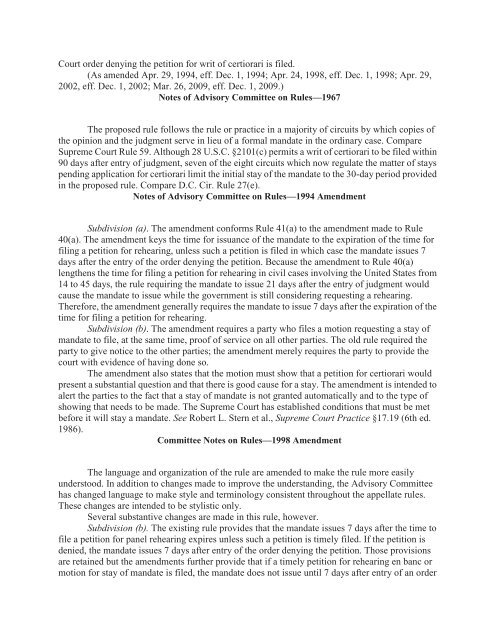Federal Rules of Appellate Procedure 2014-2015, 2014a
Federal Rules of Appellate Procedure 2014-2015, 2014a
Federal Rules of Appellate Procedure 2014-2015, 2014a
Create successful ePaper yourself
Turn your PDF publications into a flip-book with our unique Google optimized e-Paper software.
Court order denying the petition for writ <strong>of</strong> certiorari is filed.<br />
(As amended Apr. 29, 1994, eff. Dec. 1, 1994; Apr. 24, 1998, eff. Dec. 1, 1998; Apr. 29,<br />
2002, eff. Dec. 1, 2002; Mar. 26, 2009, eff. Dec. 1, 2009.)<br />
Notes <strong>of</strong> Advisory Committee on <strong>Rules</strong>—1967<br />
The proposed rule follows the rule or practice in a majority <strong>of</strong> circuits by which copies <strong>of</strong><br />
the opinion and the judgment serve in lieu <strong>of</strong> a formal mandate in the ordinary case. Compare<br />
Supreme Court Rule 59. Although 28 U.S.C. §2101(c) permits a writ <strong>of</strong> certiorari to be filed within<br />
90 days after entry <strong>of</strong> judgment, seven <strong>of</strong> the eight circuits which now regulate the matter <strong>of</strong> stays<br />
pending application for certiorari limit the initial stay <strong>of</strong> the mandate to the 30-day period provided<br />
in the proposed rule. Compare D.C. Cir. Rule 27(e).<br />
Notes <strong>of</strong> Advisory Committee on <strong>Rules</strong>—1994 Amendment<br />
Subdivision (a). The amendment conforms Rule 41(a) to the amendment made to Rule<br />
40(a). The amendment keys the time for issuance <strong>of</strong> the mandate to the expiration <strong>of</strong> the time for<br />
filing a petition for rehearing, unless such a petition is filed in which case the mandate issues 7<br />
days after the entry <strong>of</strong> the order denying the petition. Because the amendment to Rule 40(a)<br />
lengthens the time for filing a petition for rehearing in civil cases involving the United States from<br />
14 to 45 days, the rule requiring the mandate to issue 21 days after the entry <strong>of</strong> judgment would<br />
cause the mandate to issue while the government is still considering requesting a rehearing.<br />
Therefore, the amendment generally requires the mandate to issue 7 days after the expiration <strong>of</strong> the<br />
time for filing a petition for rehearing.<br />
Subdivision (b). The amendment requires a party who files a motion requesting a stay <strong>of</strong><br />
mandate to file, at the same time, pro<strong>of</strong> <strong>of</strong> service on all other parties. The old rule required the<br />
party to give notice to the other parties; the amendment merely requires the party to provide the<br />
court with evidence <strong>of</strong> having done so.<br />
The amendment also states that the motion must show that a petition for certiorari would<br />
present a substantial question and that there is good cause for a stay. The amendment is intended to<br />
alert the parties to the fact that a stay <strong>of</strong> mandate is not granted automatically and to the type <strong>of</strong><br />
showing that needs to be made. The Supreme Court has established conditions that must be met<br />
before it will stay a mandate. See Robert L. Stern et al., Supreme Court Practice §17.19 (6th ed.<br />
1986).<br />
Committee Notes on <strong>Rules</strong>—1998 Amendment<br />
The language and organization <strong>of</strong> the rule are amended to make the rule more easily<br />
understood. In addition to changes made to improve the understanding, the Advisory Committee<br />
has changed language to make style and terminology consistent throughout the appellate rules.<br />
These changes are intended to be stylistic only.<br />
Several substantive changes are made in this rule, however.<br />
Subdivision (b). The existing rule provides that the mandate issues 7 days after the time to<br />
file a petition for panel rehearing expires unless such a petition is timely filed. If the petition is<br />
denied, the mandate issues 7 days after entry <strong>of</strong> the order denying the petition. Those provisions<br />
are retained but the amendments further provide that if a timely petition for rehearing en banc or<br />
motion for stay <strong>of</strong> mandate is filed, the mandate does not issue until 7 days after entry <strong>of</strong> an order


















